
“Many maladies are due not so much to what happens to us as our inability to adapt, and they have therefore been called ‘diseases of adaptation.’” –Hans Selye
It’s the year 15,000 BC and you’ve just killed a young wild boar. Your mouth is already watering with anticipation when you spot something out of the corner of your eye. Your turn your head and see an enormous, angry mother boar charging towards you.
Your heart pounds. Your muscles tense. You know that there’s no way you can outrun an angry boar, but your spear is still lodged in the piglet. As the mother boar nears, you sprint to the nearest tree and quickly shimmy up it, knowing that wild boars can’t climb trees. You’re breathing fast, and rivulets of sweat stream down your temples as the mother boar snorts and scratches around the tree trunk before giving up.
You’ve just experienced a stress response: your adrenal glands released copious amounts of adrenaline, epinephrine, and cortisol – hormones that help you escape danger.
Fast forward to the year 2013. You’re walking into a restaurant for a first date. Or someone cuts you off in traffic. Maybe you’re moving to a new city. Planning a wedding. Or divorcing. Rushing to meet a deadline at work. You slept through your alarm and wake up ten minutes before you’re supposed to be at work.
Guess what? In each of those situations – yes, even the positive/exciting ones – your body responds the same way it would if a wild boar was threatening your life: by pumping out those same stress hormones to prepare you to fight for survival. In the case of long-term stressors like a divorce or a move, your body is constantly awash in stress hormones. If that seems like overkill, it is – and it’s harmful.
We’re all aware of the importance of proper nutrition and regular exercise. But did you know that stress management is equally important? Most of us deal with multiple short and long-term stressors, which can lead to chronic stress – which is when your cortisol levels remain elevated.
Chronically high cortisol interferes with digestion, weight-loss, immunity, sleep, and the body’s ability to produce other hormones, including sex and thyroid hormones. Chronic, long-term stress is linked to cardiovascular disease, diabetes, anxiety and depression. It can have an adverse effect on cancer treatments. Research also shows that stress plays a role in the loss of control when it comes to gambling and consumption of tobacco, alcohol and food.
We can’t eliminate stress completely, but what we can do is successfully manage the necessary stress and minimize the effects of chronic stress by supporting our adrenal glands.
Ways to Reduce Your Stress
Here are some important ways to ensure that stress doesn’t have a debilitating effect on your life:
Get rid of unnecessary stressors
I recently moved closer to my job, so now in lieu of a stressful 90 minute commute, I enjoy a serene 20 minute walk to work. There are other, less extreme ways of eliminating stress. Stop investing in one-sided friendships (and romantic relationships). Say no to an extra project or commitment you know, deep down, you don’t have time for. Hire a housecleaner rather than dread cleaning the house each week. Refuse to watch any of the Real Housewives shows, because you get so worked up yelling at the TV (not that I’d know anything about that…lol).
Balance your blood sugar
Chronic stress can chronically raise your blood sugar. Balance it by eating three paleo-esque meals per day. Spacing your meals will allow your blood sugar to return to baseline – and the more time your blood sugar levels remain there, the better. Eating meals high in protein, fat and fiber will help the reduce blood sugar spikes and crashes often caused by refined grains and sugar.
Highly inflammatory foods like grains and refined sugar will cause stress too by increasing gut dysfunction and blocking mineral absorption. It is best to find an eating lifestyle that balances blood sugar and removes gut irritants to lower stress year round.
Do low-intensity exercise
Exercise in almost any form (scrambling up a tree to escape an angry wild boar excepted) boosts feel-good endorphins, but low-intensity exercises like walking, yoga, and swimming also lower your cortisol levels. High-intensity exercise like Crossfit, mountain biking and interval training are highly beneficial in increasing strength, aiding in weight loss, and increasing cardiovascular health, but they also increase your cortisol levels. If your goal is lowering body fat, consider limiting high-intensity workouts to 2-3 days per week and opt for low-intensity on the other day which will reduce cortisol.
Consider acupuncture
The Journal of Endocrinology reported that acupuncture can alter stress hormones, effectively reducing stress. Locate a sliding-scale community acupuncture clinic here.
I know Grass Fed Girl is a big fan of community accupunture and she goes every week!
Focus on B Vitamins
While getting plenty of all three B vitamins is essential, pantothenic acid (B5) is especially important in supporting the adrenals. All meats (hopefully grass fed) are good sources of B vitamins, as are sweet potatoes, broccoli, seafood and egg yolks.
Mandatory Meditation
Meditation is often top of the list for reducing emotional stress, but if the idea of quieting your mind seems impossible, hypnosis might be a good alternative. Both the American Medical Association and the American Psychological Association recognize hypnotherapy as a valid medical procedure. You can make an appointment with a hypnotherapist, or simply make use of free (and often very good) stress relief hypnosis videos on YouTube. Varying in length from 5 minutes to over an hour, they’re easy to fit into your schedule. I’ve been known to load one on my smart phone, plug in headphones and slip on sunglasses and go into a stress-relieving hypnotic trance in parks from time to time.
Check some out free meditation videos here.
One of my favorite ways to meditate is to use the free podcast meditation oasis.
Incorporate vitamin C
A German study found that 1000 mg daily of vitamin C helps reduce both the physical and psychological effects of stress on people. Foods high in vitamin C include all citrus, cruciferous vegetables (broccoli, cauliflower, kale, etc.), strawberries, apples, and tropical fruits like kiwi and papaya. Note that Vitamin C is reduced by heat, so either consume these foods lightly cooked or raw. Most people need an additional supplement to help heal adrenals and reduce stress reactions.
It is important to get Vitamin C from non-gmo, corn free sources like acerola and camu camu
Limit caffeine
Caffeine intake raises cortisol levels for approximately six hours, according to the journal Psychosomatic Medicine. You should never drink caffeine on an empty stomach, so if you’re unable to give up your morning coffee, be sure to drink it with a meal. A lower-caffeine alternative to coffee is green tea or matcha green tea, both of which should be consumed with food, but away from protein – perhaps at 10 am with some kale chips or buttered sweet potato. Limiting caffeine will help balance stress hormones and positively impact your sleep!!
Emphasize potassium
High levels of potassium can help mitigate stress, while excessive stress can lower potassium levels. While you probably are aware that bananas are high in potassium, avocados, dark leafy greens, dried apricots and salmon are all more abundant sources of the mineral.
Try an Epsom salt bath
Mark Hyman, MD calls magnesium is the most powerful relaxation mineral, even going so far as to say it is an “antidote for stress.” It also may be the most commonly deficient mineral in our population, which is bad news as high levels have been found to be excreted in the urine of people under chronic stress. Luckily, an easy (and relaxing!) way of increasing your body’s magnesium is by taking an Epsom salt bath. Several times per week, try adding 2 cups of Epsom salts to a warm bath and soaking for at least 12 minutes. The magnesium in the salts is readily absorbed through your skin.
Bonus Tip: Pursue joy!
Make time to do things you love and that put you at ease. That can be in the form of spending time with loved ones and/or pets, volunteering or perhaps pursing a solitary hobby like painting or reading. One of the best ways to reduce stress is by doing nothing and just going to sleep! One of my biggest joys in life is a good nap!
Share in the comments how you prefer to pursue joy….
Hope this post didn’t stress you out!
Thanks for reading.
-Coco ( intern at Grassfedgirl.com)
Be sure to like coco’s facebook page!
Are you looking for a stress lowering diet?
Get this great e-book for getting started on a grain free lifestyle!
Sources:
http://www.ncbi.nlm.nih.gov/pmc/articles/PMC2257922/
http://www.huffingtonpost.com/dr-mark-hyman/magnesium-the-most-powerf_b_425499.html
http://jap.physiology.org/content/111/6/1540.extract#




